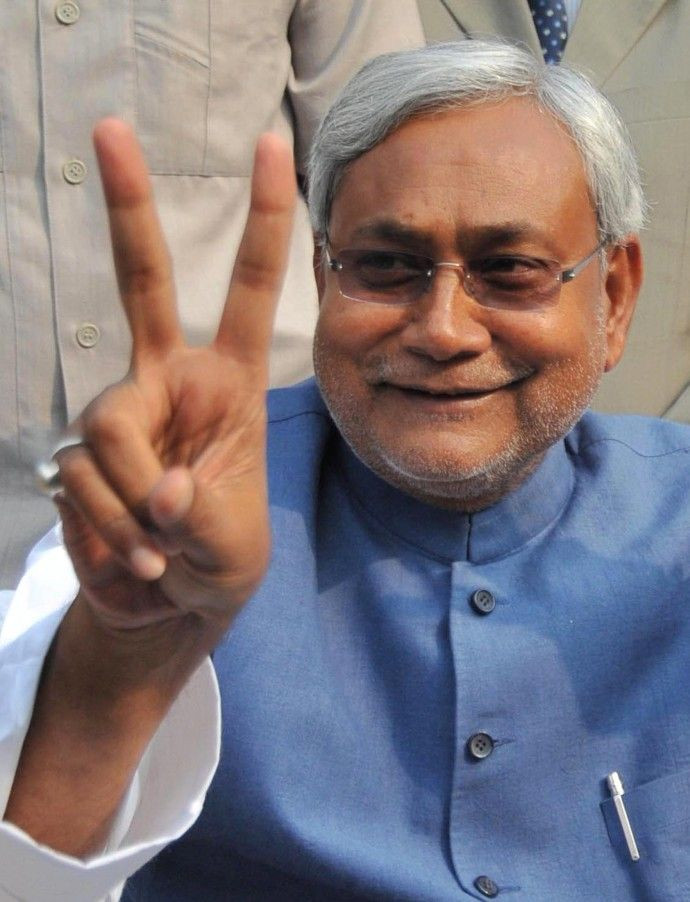End to criminal society, a major winning plank for Nitish Kumar

When the Janata Dal (United)-Bharatiya Janata Party alliance led by Chief Minister Nitish Kumar came to power in Bihar five years ago, state highways leading to the capital city had new sign boards saying, “Keep smiling, for, you are in Patna”.
From the smile, it turned into a sustainable development that the government embarked upon in Bihar. It strengthened the initial psychological impact, which is returned in the form of a thumping majority for the coalition government in Bihar on Wednesday.
When he took over, law and order, education system, infrastructure and the entire governance was in shambles that it was known called a 'Jungle Raj' that he had to inherit and refine. The Nitish Kumar government, over the last five years, has done well to dismantle the 'Jungle Raj', says a media professional from Bihar.
“The Dalits or untouchables were given bicycles, clothes and more, that led them to vote positively, not for the candidate of their caste, but for the one who fulfilled their necessities,” Satish Mishra, Gaya bureau chief of Hindustan, a national daily, pointed out. He said Nitish's governance has changed the psychology of the people in Bihar. People now see development and not caste, he said.
Mishra says that an improvised law and order situation in the state has reduced crime record in Bihar. “Once kidnappings used to be the main source of news from Bihar, now criminals are aware of the tough administration,” he said.
According to Vinod Kumar Tiwary, district crime reporter for Hindi daily Hindustan in Sasaram of Bihar, the Nitish Kumar government set the state police free in arresting criminals, unlike the earlier governments when criminals enjoyed the support of politicians, and very rarely arrests were made.
“Police were suppressed during Lalu’s regime; Nitish gave them the freedom to independently carry on their responsibilities. As the administration got tough, criminals either fled or were arrested,” Tiwary told IBTimes over phone, adding that fast-track courts in Bihar convicted and sentenced more criminals than courts in any other Indian state in the first 18 months of the present government.
In May this year too, a fast track-court in the state gave life sentence to nine criminals, accused of kidnapping an eminent doctor, in just an 18-day trial, a record verdict in Bihar.
Another notoriety that has crippled Bihar is the feudal set up embroiled with wide distinction between upper and lower castes that was exploited much during Lalu’s reign. However, it is getting over and will soon vanish, if the present government continues to be in power, believes Rajesh Kumar, a senior journalist in Gaya.
“Nitish Kumar, who himself belongs to a lower caste never encouraged caste-based favors in governance, his focus on development was tangible throughout his term,” Kumar said.
Kumar, who has been covering the Department of Consumer Affairs and Public Distribution System regularly as part of his beat, feels that the second term will be more challenging for the JD(U) government as Nitish Kumar still has to work on the problems faced by farmers and consumers, and the corruption and loopholes in the public distribution system. Lack of resources in agriculture and Naxalism are some major issues he should deal with now, he said.
Speaking on the problem of Naxalism, Vinod Tiwary equally stresses the need for the government’s intervention. He mentions that earlier this year in the Rohtas region of Bihar, Naxalites hired 25 boys and 10 girls aged above 18 years at 1,800 rupees per month, to work for them.
“If Naxalites can pay 1,800 rupees to youths making them hostile against governance, why can’t the government employ them in police at 3,000 rupees per month to curb those Naxalites?,” he says.
Since unemployment is their main concern, these poor youth hope the second term for the Nitish Kumar government would find a way out, says Mohammad Azhar Zaman, bureau chief of Urdu Shara newspaper in Gaya.
“Though teachers were recruited in public schools and that has sent a lot of confidence among the people, the state government has to work a lot to attract industrialists and investors to boost the economy of the state,” he said.
Earlier this year, Bihar registered 11.03 percent growth in GDP that made it the second fastest-growing state economy in India after the western state of Gujarat that recorded 11.05 percent growth over the same period.
Besides, women power in the state has emerged significantly with equal seats reserved for women as men in local municipal bodies and there has been a rise in the number of children attending schools.
As the chief minister was attributing his success to his developmental work, compliments on his governance pouring in on social networking sites provide a deeper insight.
“The victory in 2005 elections was not being considered positive by many as people thought that majority voted Nitish because they were angry with Lalu's (earlier government) government but this landslide win isn’t anymore the result of anger or frustration; people have seen the change and they wanted Nitish back,” Sonam Singh, a resident of Bihar working in Pune, writes on her Facebook.
Another Facebook user from Bihar, Kasturi Jha who works in Bangalore, writes, “Nitish Kumar won over Bihar with appropriate actions and not with mere words. People could see the change and thus the trust grew manifold.”
“When I was a kid I never went out with family in the evenings, drive down roads late night, walk out of the house all alone. Fear was perhaps the most dominating factor. I find a sea change and today when I see the same government, which brought this change, I feel elated,” reads the Facebook message of Sushmita Pandey, who grew up in Bihar.
© Copyright IBTimes 2024. All rights reserved.





















